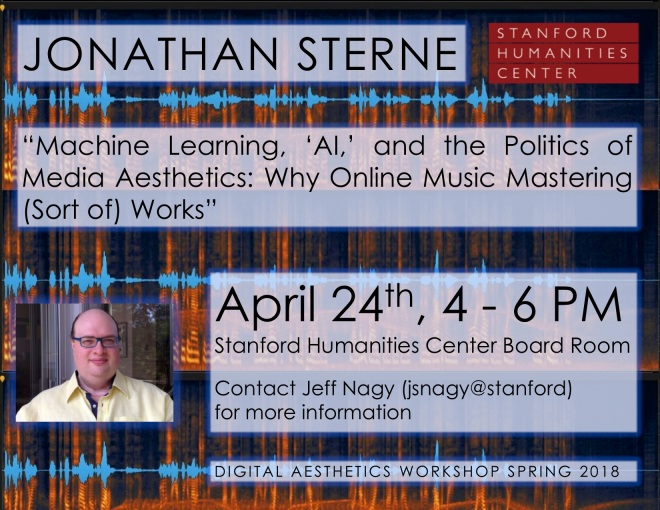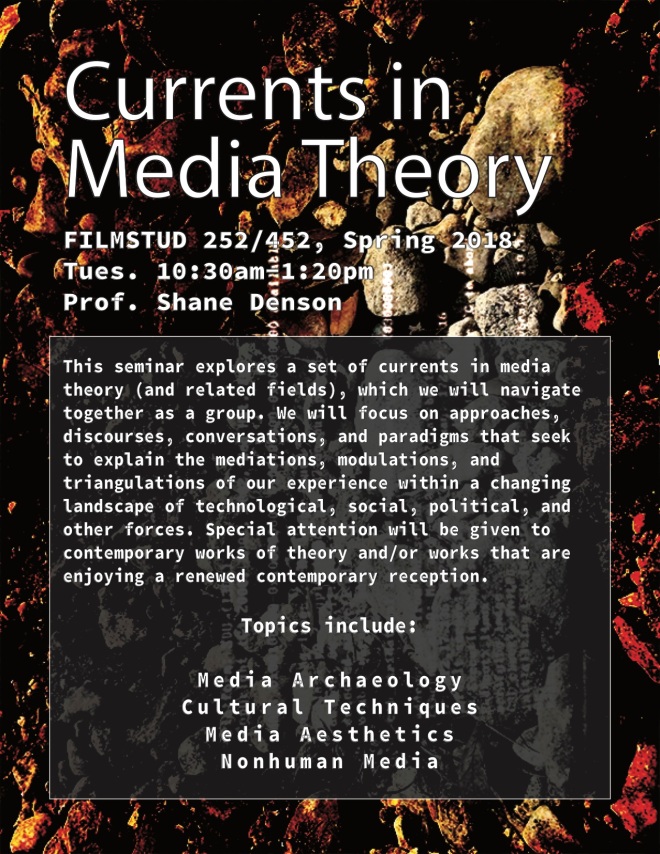
This July, I am excited to be one of the faculty at the Media Aesthetics Summer Institute at Northwestern University, along with Nico Baumbach, Dahye Kim, Hannah Zeavin, and Chenshu Zhou. Please consider applying if this intensive, interdisciplinary workshop could benefit your work. The call for applications and further info are below:
Call for Applications
2023 Summer Institute in Rhetoric, Media, and Publics
Northwestern University, Evanston, IL 60208
In Person, July 17–21, 2023
The deadline for applications is Tuesday June 6, 2023
Media Aesthetics V:
The annual Rhetoric, Media, and Publics Summer Institute at Northwestern University is scheduled to be held on July 17-21, 2023 (with arrival July 16 and departure July 22).
Institute conveners are Dilip Gaonkar (Rhetoric, Media, and Publics, Northwestern University) and James J. Hodge (English, Northwestern University).
The theorization of media often begins with a story about the history of the senses and the sensorium and how that history might be understood in terms of the ways new technologies transform our individual and collective abilities to see, hear, and communicate. The 21st-century computational saturation of culture by mediated forms as the infrastructure of ordinary life poses new challenges to this project. While many projects emphasize the algorithmic and technical dimensions of the internet age, the media aesthetics project (now in its 5th year) is devoted to exploring ordinary experience. How, for instance, does the rise of internet culture into culture as such bring into being new forms of social belonging, personhood, and collective desire? What aesthetic forms — new or old — grant the most critical traction on grasping our historical present? What critical/interpretive languages do we need to devise to respond constructively to the politically vexed and culturally fragmented ethos of the present? In this project, we hope to explore and interrogate the mediated experience of the present as it mutates, propelled by the rapidly shifting dynamics of capitalist modernity, and while mutating both discloses and conceals the possibilities and perils before us.
Institute Format and Application Process
The institute will consist of five days of presentations and discussions led by visiting scholars and Northwestern faculty. This year’s visiting scholars include: Nico Baumbach (Columbia University), Shane Denson (Stanford University), Hannah Zeavin (Indiana University), and Chenshu Zhou (University of Pennsylvania). This year’s contributing Northwestern University faculty includes Dahye Kim (Asian Languages and Cultures).
The institute is sponsored by the Center for Global Culture and Communication (CGCC), an interdisciplinary initiative of Northwestern University’s School of Communication. The CGCC will subsidize transportation (up to $250), lodging (double-occupancy), and some meals (breakfast and lunch every day and two group dinners) for admitted students. Applicants should send a brief letter of nomination from their academic advisor, along with a one-page statement explaining their interest in participating in this year’s institute, to the summer institute coordinator Bipin Sebastian (bipinsebastian@u.northwestern.edu) We will adopt a policy of rolling admissions. Priority will therefore be granted to strong applications that are submitted in a timely fashion, preferably by June 6, 2023. All inquiries should be directed to Bipin Sebastian.
Summer Institute Schedule (tentative):
Monday 7/17
Welcome and Introductions (am): Dilip Gaonkar & James J. Hodge
Shane Denson talk (pm): “Of Algorithms, Aesthetics, and Embodied Existences”
Tuesday 7/18
Denson workshop (am)
Chenshu Zhou talk (pm): “The Boredom and Excitement of Live Streaming”
Dahye Kim talk (pm): “Korean Writing in the Age of Multilingual Word Processing: Reterritorialization of Scripts and the Cultural Technique of Writing”
Wednesday 7/19
Zhou workshop (am)
Nico Baumbach talk (pm): “Conspiracy as Theory, Theory as Conspiracy”
Thursday 7/20
Baumbach workshop (am)
Hannah Zeavin talk (pm): ” Screening Mother, Coding Baby: Attachment, Deprivation, and the American Prison”
Friday 7/21
Zeavin workshop (am)
Faculty Bios:
Nico Baumbach Nico Baumbach is Associate Professor of Film and Media Studies at Columbia University. His research and teaching focus on critical theory, film and media theory, documentary, and the intersection of aesthetic and political philosophy. He is the author of Cinema/Politics/Philosophy (Columbia University Press, 2019) and The Anonymous Image: Cinema Against Control (Columbia University Press, Forthcoming). He is currently working on a book on the relationship between critical theory and conspiracy theory.
Shane Denson is Associate Professor of Film and Media Studies and, by Courtesy, of German Studies and of Communication at Stanford University, where he also serves as Director of the PhD Program in Modern Thought & Literature. His research interests span a variety of media and historical periods, including phenomenological and media-philosophical approaches to film, digital media, and serialized popular forms. He is the author of Post-Cinematic Bodies (2023), Discorrelated Images (2020), and Postnaturalism: Frankenstein, Film, and the Anthropotechnical Interface (2014). See shanedenson.com for more information.
Dahye Kim is an Assistant Professor of Asian Languages and Cultures at Northwestern University. Her research and teaching focus on modern Korean literature and culture, critical approaches to media history, and the cultural dimensions of communication technologies in East Asia. Dahye is particularly interested in exploring the evolving significance and signification of literature and literacy in the digital age. Her current project, tentatively titled “Techno-fiction: Science Fictional Dreams of Linguistic Metamorphosis and the Informatization of Korean Writing,” delves into the radical transformation of writing and literature in the new technological environment of the 1980s and 1990s South Korea.
Hannah Zeavin is a scholar, writer, and editor. She is an Assistant Professor of the History of Science at the University of California at Berkeley (Department of History & The Berkeley Center for New Media). Zeavin is the author of The Distance Cure: A History of Teletherapy (2021) and Mother’s Little Helpers; Technology in the American Family (forthcoming), both from MIT Press. She is the Founding Editor of Parapraxis.
Chenshu Zhou (she/her) is Assistant Professor of Cinema Studies in the History of Art Department and the Cinema and Media Studies Program at the University of Pennsylvania. She received her PhD from Stanford University. Zhou’s research explores a variety of questions related to the moving images, in particular spectatorship, exhibition, and temporality. She is the author of Cinema Off Screen: Moviegoing in Socialist China (University of California Press, 2021), which received the 2022 Best First Book Award from the Society of Cinema and Media Studies. Her second ongoing book project investigates the relationship between work and screen media consumption against China’s transition from socialism to neoliberal authoritarianism.



